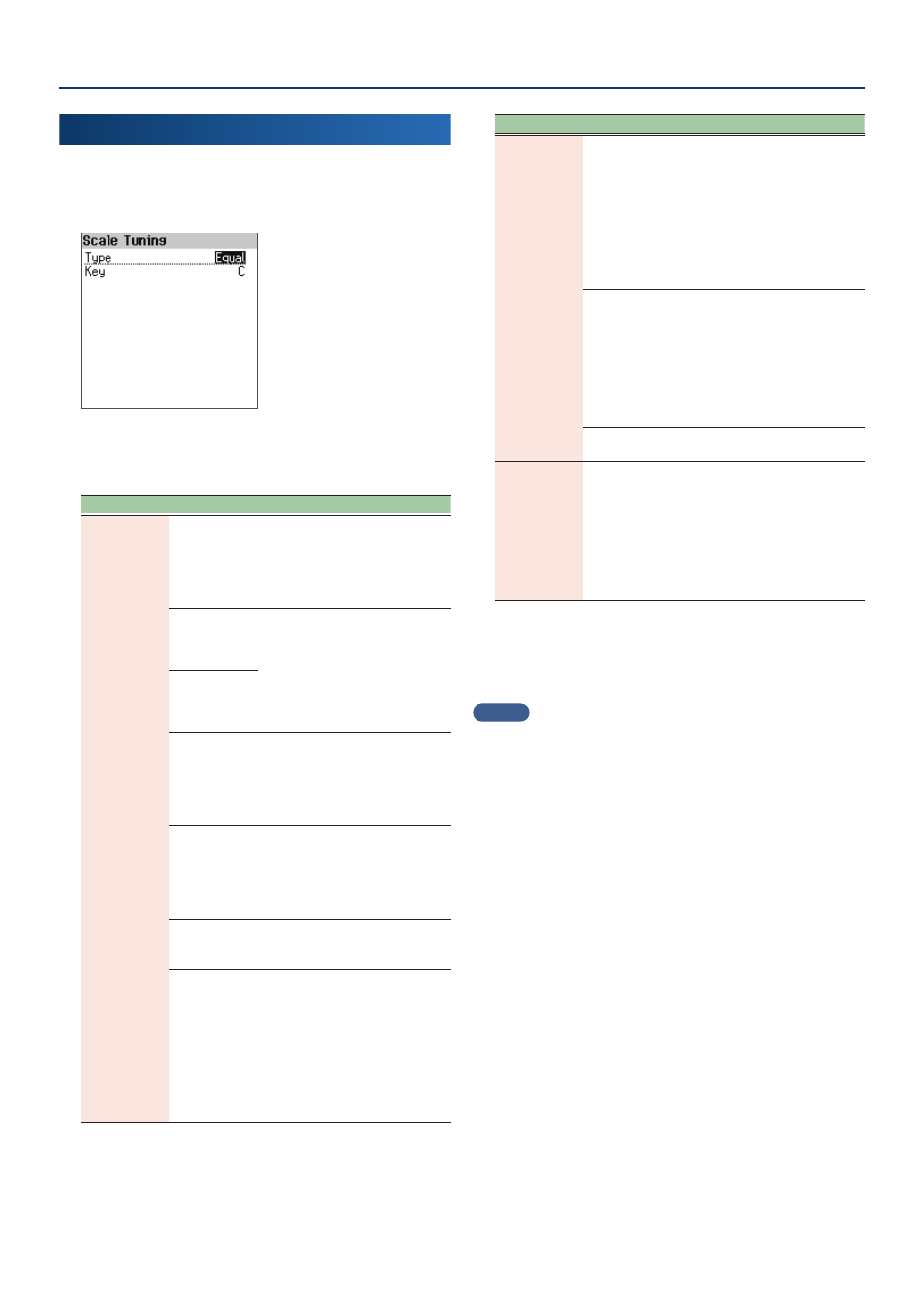Changing the tuning method (scale tuning), Changing the tuning method, Scale tuning) – Roland FP-E50 88-Key Portable Digital Piano User Manual
Page 62: Changing the tuning method (scale tuning)” (p. 62), Editing a scene (scene edit)

Editing a Scene (Scene Edit)
62
62
Changing the Tuning Method
(Scale Tuning)
1.
On the Scene Edit screen, use the [
дд
] [
ее
] buttons to
select “Scale Tuning” and press the [Enter] button .
The Scale Tuning screen appears.
2.
Use the [
дд
] [
ее
] buttons to select the parameter, and
then use the [Dec] [Inc] buttons to change the value .
Parameter
Value
Explanation
Type
Equal
This temperament divides the
octave into twelve equal steps. It
is the temperament that is most
commonly used on today’s pianos.
Every interval has the same slight
amount of dissonance.
Just Major
In these temperaments, the primary
triads are perfectly consonant. It
is unsuited to playing melodies
and cannot be transposed, but is
capable of beautiful sonorities. The
Just tunings differ from major and
minor keys.
Just Minor
Pythagorean
This tuning, devised by the
philosopher Pythagoras, eliminates
dissonance in fourths and fifths.
Although third chord is slightly
dissonant, this tuning is suitable for
songs that have a simple melody.
Kirnberger I
As in the Just temperaments, the
primary triads are consonant in
this tuning. Beautiful sonorities are
obtained when playing songs that
are written in keys appropriate for
this tuning.
Kirnberger II
This is a revision of Kirnberger I
that reduces the limitations on the
usable keys.
Kirnberger III
This is an improvement of the
Meantone and Just tunings that
provides a high degree of freedom
of modulation.
Performances are possible in all
keys. Since the resonance differs
depending on the key, chords
played in this temperament
resonate in diverse ways when
compared to equal temperament.
Parameter
Value
Explanation
Type
Meantone
This temperament slightly
narrows the fifth relative to Just
temperaments. While the Just
temperaments contains two types
of whole tone (major whole tone
and minor whole tone), meantone
temperament uses only one type
of whole tone (mean whole tone).
Transposition within a limited
range of keys is possible.
Werckmeister
This temperament consists of eight
perfect fifths and four narrowed
fifths. Performance in all keys is
possible.
Since different keys produce
different sonorities, chords will
resonate in diverse ways when
compared to equal temperament
(Werckmeister I (III)).
Arabic
This scale is suitable for Arabic
music.
Key
C–B
When playing with tuning other
than equal temperament, you need
to specify the temperament key for
tuning the song to be performed
(that is, the note that corresponds
to “do” for a major key or to “la” for a
minor key). If you choose an equal
temperament, there’s no need to
select a temperament key.
3.
If you want to save the edited settings, execute the
Write operation .
Ø
“Saving a Scene (Scene Write)” (p. 27)
MEMO
If you switch to a different scene, or turn off the power after editing the
settings, the edited settings are lost . If you want to keep the data, you
must save it .
